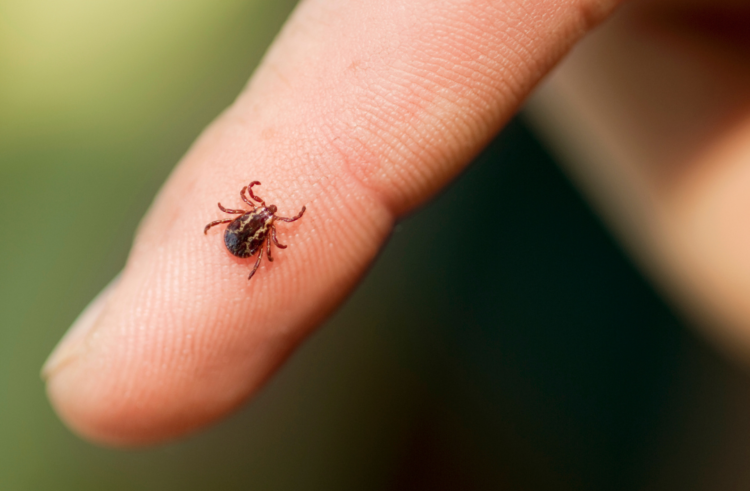One of the best things about outside time in Winter is not having to worry about bugs that bite. After all, pesky critters like mosquitoes and horseflies are out of the equation. But can we say the same about ticks? As I found out the hard way, the common belief that ticks die off in winter is a misconception.
In this Naturalist Answers post, let’s learn about what happens to them in the winter months and get to the bottom of whether they ticks die in winter.
The tick life cycle

As with understanding any other wildlife, it helps to start with ticks’ life cycle. In other words, the stages every individual passes through as they grow, mature, and reproduce. Like I covered in my post on whether ticks are more active in the Fall, ticks have four main life stages:
- Egg
- Larva
- Nymph
- Adult
In most species, females lay eggs in the Spring, and then those young mature over the Summer. It often takes two summers for a tick to eat and grow enough to molt into an adult. Then, those adults mate in the Summer and Fall to start the process over again.
Ticks in the winter

So, hold on a sec. If female ticks are mating in the Summer and Fall and laying their eggs in Spring, they have to survive the winter, right? Right!
Just a quick glance at how ticks live tells us that some of them have to survive the Winter. Otherwise, there wouldn’t be any the following year. Not that some of us would mind.
To, do ticks die off in Winter? Absolutely not! Instead, we should be asking:
How do ticks survive the winter?
Like other bugs, ticks have a variety of strategies for surviving the winter. Two in particular are most common:
- Attaching to a warm host
- Hiding in the leaf litter
Cuddling with “friends” for winter

Ticks that are lucky enough to latch onto a warm animal as Winter approaches will have it made. As long as they don’t get groomed or scratched off, they will have a warm place to stay. Additionally, their cozy home comes with free meals! This is an even better deal for them if their host is a hibernating animal that will sit still somewhere safe for months on end.
Laying low
If ticks are stuck out in the cold, several adaptations can protect them from super-cold temperatures. For example, they can minimize the water in their cells to prevent freezing damage. Also, they may secrete special sugary compounds into their tissues that allow them to freeze without damage. These are called cryoprotectants.

With this chemical protection, adult ticks will survive the winter if they can find shelter. Many of them do this by moving down into the forests’ leaf litter when it starts to get cold. This will keep them dry and sheltered while they go dormant and potentially freeze before Spring.
As you might have guessed, this could mean that leaving the leaves in your yard could lead to more ticks. In my experience, though, outside of rural areas, the leaf litter more often supports many more beneficial critters than ticks. If you’ve got turkeys or possums around, you might also count on them to get those ticks cleaned up!
Of course, ticks can find lots of other cozy places to keep “warm” in the Winter. They can burrow into deep soils or hide in cervices or under logs and rocks. Even a nice layer of snow can be a helpful insulating agent for them!
Can you get ticks on you in Winter?
The bad news is that adult ticks are definitely still “out there” all Winter long. The good news is that, even though ticks survive the winter, they are definitely less active. With the exception of Fall-active deer ticks (Ixodes scapularis) in North America, most ticks are sluggish and not actively “questing” (looking for hosts) in Winter. So yes, you can still get ticks on you in the Winter, but it is definitely a reduced risk in most areas.
However, if it gets warm, like over 45°F (~7°C) for a couple of days, ticks will become active again. So if you decide to go for a stroll in the woods during a couple warm days in winter, check carefully for ticks!
At what temperature do ticks die off in Winter?

So is there a point at which ticks do die off in the Winter? According to laboratory research and other studies in the wild, prolonged low temperatures, exposure to freezing water, and lack of sheltering sites can affect ticks’ over-winter survival. Serious deep freezes (days or weeks below 10°F/-12°C) are necessary to actually kill ticks by cold.
Instead, big fluctuations in temperature may be more dangerous for ticks. Scientists hypothesize that warm spells may tempt them out from their hiding places, where they are exposed if temperatures suddenly drop again.
Thanks for reading about whether ticks die in winter!
Have you run into ticks during any Winter outdoor activities? Share with us in the comments! If you have other questions you’d like to see in Naturalist Answers, drop me a line using the Contact page. Until next time!

